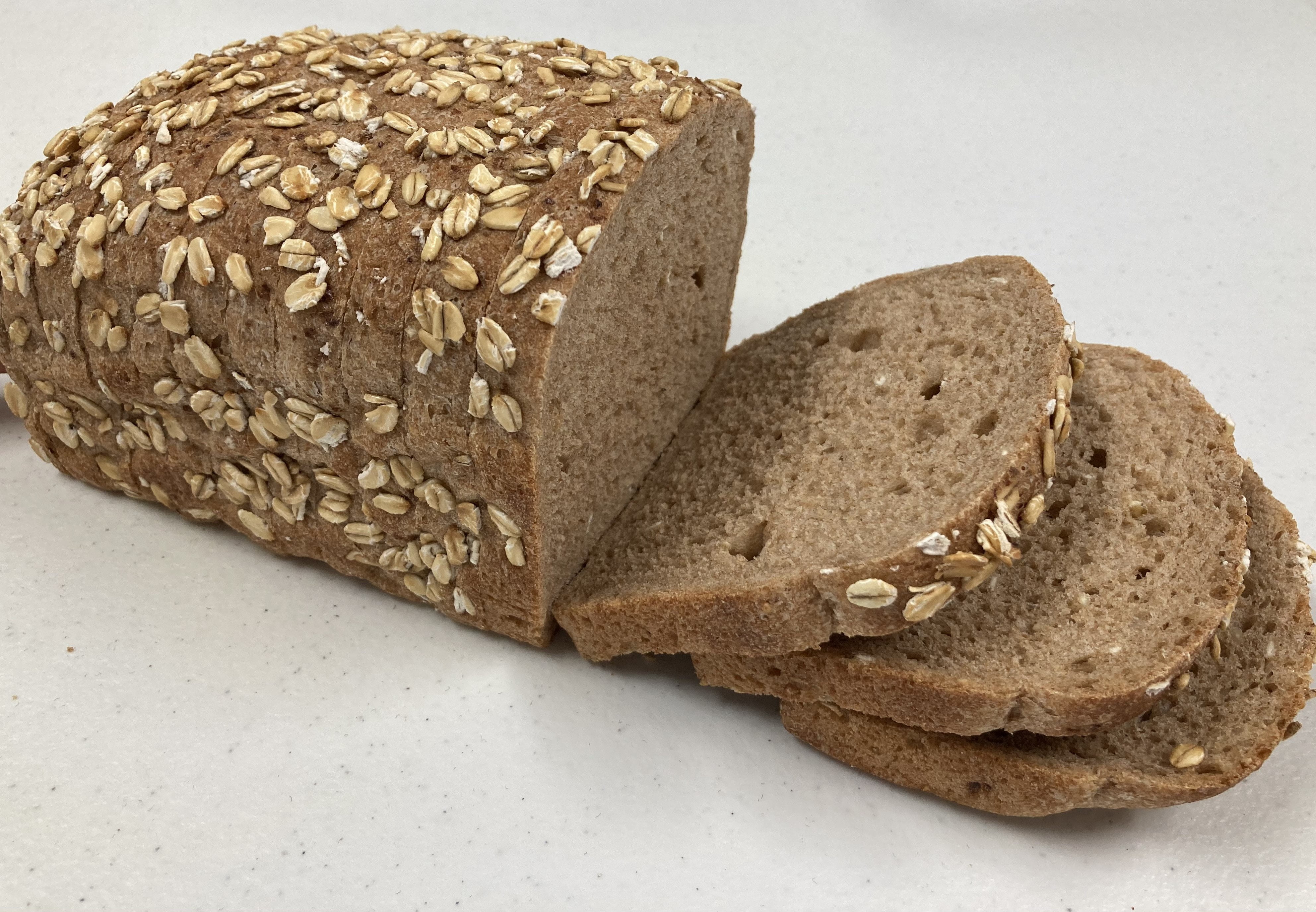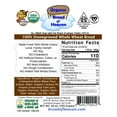Organic bread of heaven is not just a trend; it’s a lifestyle choice that promotes health, sustainability, and superior taste. If you’re looking for bread that nourishes your body while respecting the environment, this article will be your ultimate guide. Whether you're a health enthusiast, an eco-conscious consumer, or simply someone who loves delicious bread, you're in the right place.
In recent years, the demand for organic products has surged, and organic bread has emerged as a staple in many households. People are increasingly seeking alternatives to conventional bread, driven by concerns about health, food quality, and environmental sustainability. Organic bread of heaven represents the pinnacle of this movement, offering a wholesome and nutritious option that satisfies both the palate and the conscience.
This article delves deep into the world of organic bread of heaven, exploring its benefits, nutritional value, production methods, and why it has become such a popular choice. Whether you’re a baker, a consumer, or simply curious about the organic food movement, this comprehensive guide will provide you with all the information you need to make informed decisions.
Read also:Evaluate The Halloween Cookies Company Pillsbury On Price In The United States
Table of Contents
- What is Organic Bread of Heaven?
- Health Benefits of Organic Bread
- The Production Process of Organic Bread
- Types of Organic Bread
- Why Choose Organic Bread of Heaven?
- Environmental Impact of Organic Bread
- How to Bake Organic Bread at Home
- Popular Brands of Organic Bread
- Common Misconceptions About Organic Bread
- Conclusion: Embrace the Organic Bread Revolution
What is Organic Bread of Heaven?
Organic bread of heaven refers to bread made from organic ingredients, free from synthetic pesticides, genetically modified organisms (GMOs), and artificial additives. The term "heaven" signifies the superior taste and quality that organic bread offers, making it a delightful experience for bread lovers. Unlike conventional bread, organic bread is crafted using natural methods that prioritize health and sustainability.
The ingredients used in organic bread are sourced from farms that adhere to strict organic standards. These farms avoid the use of harmful chemicals, ensuring that the bread is not only safe for consumption but also environmentally friendly. Organic bread of heaven is often praised for its rich flavor, soft texture, and nutritional value, making it a favorite among health-conscious consumers.
Key Features of Organic Bread of Heaven
- Made from 100% organic ingredients
- Free from synthetic chemicals and additives
- Rich in essential nutrients
- Environmentally sustainable
Health Benefits of Organic Bread
One of the primary reasons people choose organic bread of heaven is its numerous health benefits. Organic bread is often made with whole grains, which are packed with fiber, vitamins, and minerals. These nutrients are essential for maintaining good health and preventing chronic diseases.
Research has shown that consuming organic bread can improve digestion, boost energy levels, and support heart health. Additionally, organic bread is free from harmful additives and preservatives, reducing the risk of adverse health effects associated with conventional bread.
Nutritional Value of Organic Bread
- High in fiber
- Rich in vitamins B1, B2, and B6
- Contains essential minerals like iron and magnesium
- Low in unhealthy fats and sugars
The Production Process of Organic Bread
The production of organic bread of heaven involves a meticulous process that ensures the highest quality and purity. From sourcing organic ingredients to baking the bread, every step is carefully monitored to maintain organic standards.
Organic wheat is typically grown on farms that use natural fertilizers and pest control methods. Once harvested, the wheat is milled into flour, which is then mixed with other organic ingredients such as yeast, water, and salt. The dough is left to rise naturally, allowing the flavors to develop fully before being baked in a traditional oven.
Read also:Pictures Of Jason Momoa A Comprehensive Visual Journey
Steps in the Organic Bread Production Process
- Sourcing organic ingredients
- Milling organic wheat into flour
- Mixing ingredients to form dough
- Allowing the dough to rise naturally
- Baking in a traditional oven
Types of Organic Bread
There are various types of organic bread available, each offering unique flavors and nutritional benefits. Some popular varieties include whole grain bread, sourdough bread, rye bread, and multigrain bread. Each type of bread is made using different organic ingredients and techniques, resulting in distinct textures and tastes.
Whole grain organic bread is particularly popular due to its high fiber content and nutritional value. Sourdough bread, on the other hand, is known for its tangy flavor and probiotic benefits. Rye bread offers a dense texture and rich taste, while multigrain bread combines the goodness of multiple grains for a balanced nutritional profile.
Popular Varieties of Organic Bread
- Whole grain bread
- Sourdough bread
- Rye bread
- Multigrain bread
Why Choose Organic Bread of Heaven?
Choosing organic bread of heaven is not just about taste; it’s about making a conscious decision to prioritize health and sustainability. Organic bread is free from harmful chemicals and additives, making it a safer option for consumption. Additionally, organic farming practices promote biodiversity and soil health, contributing to a healthier planet.
Consumers who choose organic bread are also supporting ethical farming practices and fair trade. By purchasing organic products, you are helping to create a more sustainable food system that benefits both people and the environment.
Reasons to Choose Organic Bread
- Healthier and safer for consumption
- Supports sustainable farming practices
- Promotes biodiversity and soil health
- Encourages ethical and fair trade
Environmental Impact of Organic Bread
The environmental impact of organic bread production is significantly lower compared to conventional bread. Organic farming methods reduce soil erosion, conserve water, and promote biodiversity. By avoiding synthetic pesticides and fertilizers, organic farms help protect ecosystems and wildlife.
Furthermore, organic bread production often involves smaller-scale operations that prioritize local sourcing and distribution. This reduces the carbon footprint associated with transportation and supports local economies.
Environmental Benefits of Organic Bread
- Reduces soil erosion and conserves water
- Promotes biodiversity and wildlife conservation
- Supports sustainable farming practices
- Reduces carbon footprint
How to Bake Organic Bread at Home
Baking organic bread at home is a rewarding experience that allows you to control the ingredients and ensure the highest quality. With a few simple steps, you can create delicious organic bread that rivals store-bought options.
To get started, you’ll need organic flour, yeast, water, and salt. Mix the ingredients to form a dough, let it rise, and bake in a preheated oven. You can experiment with different organic ingredients, such as seeds and nuts, to add extra flavor and nutrition to your bread.
Steps to Bake Organic Bread
- Measure and mix organic ingredients
- Knead the dough until smooth and elastic
- Let the dough rise in a warm place
- Preheat the oven and bake the bread
- Cool and enjoy your homemade organic bread
Popular Brands of Organic Bread
If you prefer to buy organic bread, there are several reputable brands that offer high-quality products. Some popular brands include Ezekiel Bread, Food for Life, and Dave’s Killer Bread. These brands are known for their commitment to organic farming practices and exceptional taste.
When choosing a brand, look for certifications such as USDA Organic or EU Organic to ensure that the bread meets strict organic standards. Additionally, check the ingredient list to ensure that the bread is free from synthetic additives and preservatives.
Top Organic Bread Brands
- Ezekiel Bread
- Food for Life
- Dave’s Killer Bread
- Alvarado Street Bakery
Common Misconceptions About Organic Bread
Despite its growing popularity, there are still some misconceptions about organic bread of heaven. One common misconception is that organic bread is more expensive than conventional bread. While organic bread may have a slightly higher price point, the health and environmental benefits often outweigh the cost.
Another misconception is that organic bread lacks flavor or texture. In reality, organic bread is often praised for its rich taste and soft texture, making it a superior choice for bread lovers. By educating yourself about organic bread, you can dispel these myths and make informed decisions.
Conclusion: Embrace the Organic Bread Revolution
In conclusion, organic bread of heaven offers a delicious and nutritious alternative to conventional bread. Its health benefits, environmental impact, and superior taste make it a popular choice among health-conscious consumers. By choosing organic bread, you are not only nourishing your body but also supporting sustainable farming practices and ethical trade.
We encourage you to try baking organic bread at home or explore the wide range of organic bread available in stores. Share your experiences and favorite recipes in the comments below, and don’t forget to check out our other articles for more information on organic food and healthy living.


